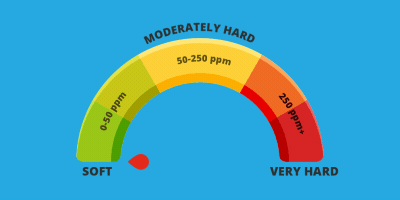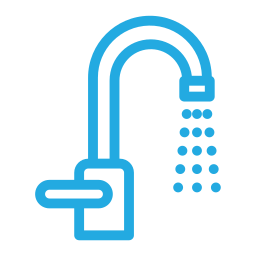How hard is the water in Dorset?
Water hardness reading:
Generally above 250ppm (very hard)

Dorset is delightful – but it does suffer from very hard water
Dorset, like many of the coastal counties of southern and south-east England suffers from very hard water. The water hardness level averages around 250 parts per million or higher across the county. Any reading above 200ppm is considered hard, so at 250ppm that’s heading towards the higher end of the range.
Dorset has all the ingredients for hard water. Its varied landscape of chalk downs, steep limestone ridges and low-lying clay valleys contains an abundance of calcium and magnesium compounds, which turn naturally soft rainwater hard.
Hard water is bad for the hair and skin and is the chief cause of limescale, which collects relentlessly on wet surfaces and, overtime, clogs up central heating systems. Your boiler is much more likely to go on the blink and need premature replacement if it is continually subject to hard water. It also means you use more energy to create the right amounts of heart and hot water – meaning inflated fuel bills.
To avoid exposure to hard water, the best solution is to have a water softener installed in your property. More and more consumers and small business operators are turning to Scott Jenkins Water Softeners for soft water salvation. Our hard-working, competitively priced softeners will take those hard water readings down to virtually zero.
Dorset – an Overview
Annual rainfall:
Southern and eastern coastal areas: 700-800mm (28-31 in) per year.
The Dorset Downs: 1000-1250 mm (39–49 in) per year.
Dorset is a county in south west England The largest settlement is Bournemouth, and the county town is Dorchester.
At the 2021 census, Dorset’s population stood at 779,775, with just over half that number living in the Bournemouth, Christchurch and Poole district.
The remainder of the county is largely rural, and its principal towns are Weymouth and Dorchester.
The Dorset coastline is dominated by the Jurassic Coast World Heritage Site, of geological and palaeontologic significance. It features a series of notable landforms including Lulworth Cove, the Isle of Portland, Chesil Beach and Durdle Door. The north of the county contains part of Cranborne Chase, a chalk downland. The highest point in Dorset is Lewesdon Hill at 915 ft.
Mains Drinking Water and Sewerage Services in Dorset
The mains water and sewerage services throughout Dorset are mainly under the control of Wessex Water, although Southern Water supplies the far east of the county.










